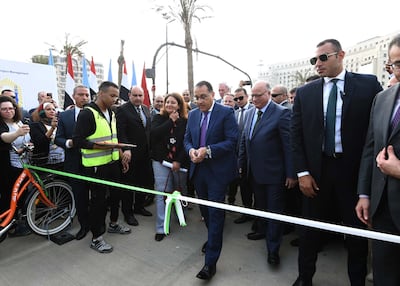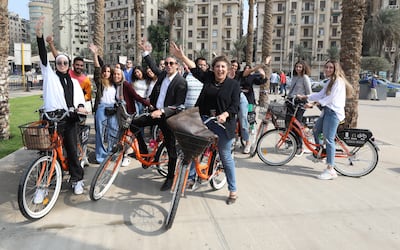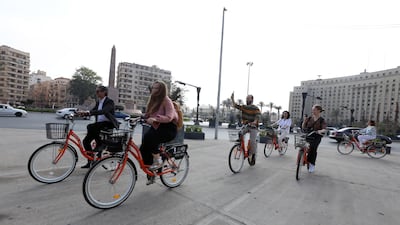Egypt's capital launched the first phase of a bike-sharing initiative on Thursday, with new cycle lanes that criss-cross some of Cairo's most congested areas.
The Cairo Bike Project has hundreds of bicycles across 26 collection and drop-off stations, spread out over the busy districts of Downtown Cairo, Garden City and Zamalek. These can be rented by anyone who downloads the app.
At a ceremony on Thursday in Cairo's historic Tahrir Square, Prime Minister Moustafa Madbouly alongside the city's governor Khaled Abdel Aal inaugurated the first bike station and launched Downtown Cairo's first bike lanes, which span a length of two kilometres across several of the district's main streets.
More bike lanes will be installed in the future, the Cabinet said on Thursday, adding that the two-kilometre stretch was merely the first phase of a project aimed at installing them all over the capital.
The lanes measure between one and two metres in width.

Though the government announced in August that the first phase of the biking initiative was under way, pedestrians reported being turned away by station attendants at the time. It was later announced that the launch was postponed due to technical delays.
How do I rent a Cairo Bike?
Users must first download a dedicated mobile app, called Donkey Republic, through which they can search for the nearest bike station and find information about the availability of bicycles.
They will also be able to pay for rides through the app using credit, debit or prepaid cards.
Cycles are currently priced at one Egyptian pound (5 US cents) per hour for adults and 70 piastres (just over 3 US cents) for high school pupils and university students. The app only allows users to incur a maximum charge of eight Egyptian pounds per day, which means there is a maximum riding time of eight hours per day.
Annual subscriptions will also be available to users at 600 Egyptian pounds ($30) for adults and 400 ($20) for students.

Riders must stay within a specific zone and the mobile app will alert them if they venture outside the area, as each bike is fitted with a GPS tracker. Should anyone leave their zone, they will first receive an SMS notifying them to return and then they will receive a call from the operations centre, according to a Cairo governorate statement.
Mr Abdel Aal said in May that Cairo Bike was one of many sustainability-focused projects that Egypt would launch before the coming UN Climate Change Conference (Cop27).
Another aim of the project, he said, is to reduce Cairo residents' dependency on cars, especially in the city's most congested districts.
In this vein, all the bike stations will be powered through solar panels and will be monitored by security cameras around the clock. Additionally, attendants will be present at all stations to assist riders with any issues they might run into, the governor said.
In case of an accident or a bike malfunction, the rider has the option to request assistance from the operations centre through the app.
The project was meant to be launched in 2017 but was delayed for unknown reasons.
President El Sisi is known to be long-time advocate of cycling and has engaged in a number of community biking events to encourage more people to cycle. Additionally, he has also been photographed riding multiple times, which has led many Egyptians to associate him with cycling.


